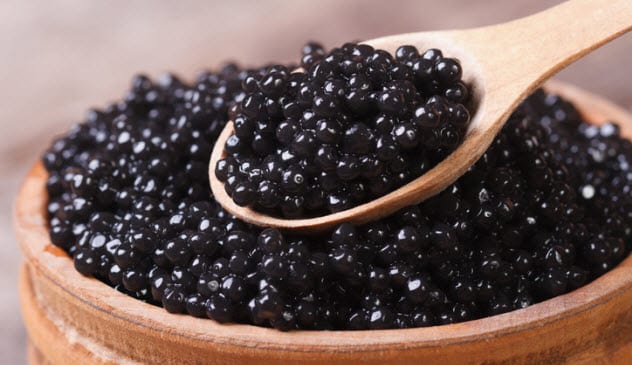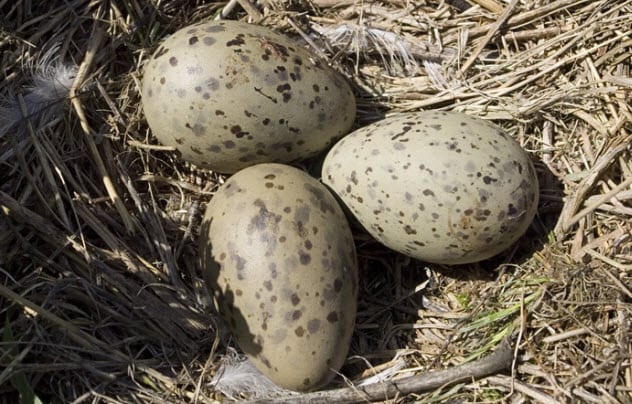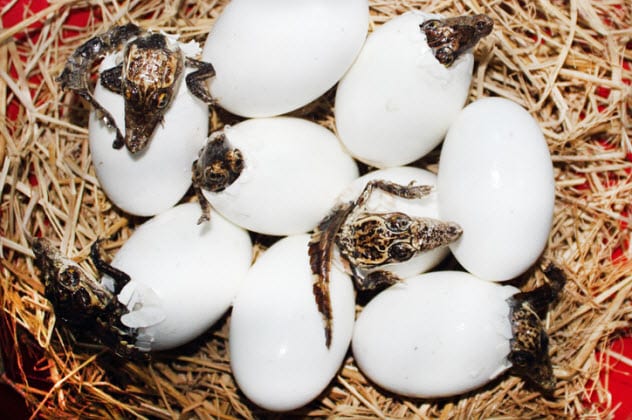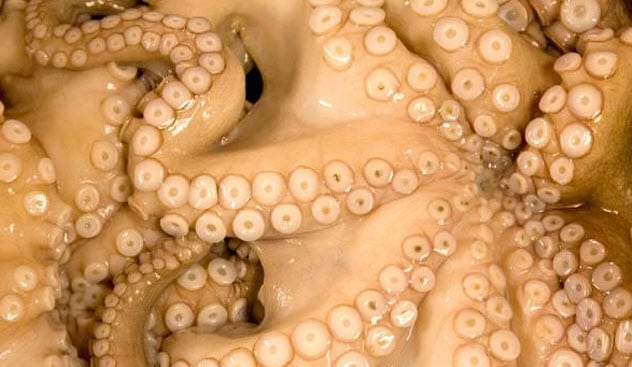 History
History  History
History  Animals
Animals Ten Times It Rained Animals (Yes, Animals)
 Mysteries
Mysteries 10 Devastating Missing Child Cases That Remain Unsolved
 Creepy
Creepy 10 Scary Tales from the Middle Ages That’ll Keep You up at Night
 Humans
Humans 10 One-of-a-kind People the World Said Goodbye to in July 2024
 Movies and TV
Movies and TV 10 Holiday Movies Released at Odd Times of the Year
 Politics
Politics 10 Countries Where Religion and Politics Are Inseparable
 Weird Stuff
Weird Stuff 10 Freaky Times When Famous Body Parts Were Stolen
 Miscellaneous
Miscellaneous 10 Interesting Things Manufacturers Stopped Making and Why
 Gaming
Gaming 10 Funny Tutorials in Games
 History
History 10 Desperate Last Stands That Ended in Victory
 Animals
Animals Ten Times It Rained Animals (Yes, Animals)
 Mysteries
Mysteries 10 Devastating Missing Child Cases That Remain Unsolved
Who's Behind Listverse?

Jamie Frater
Head Editor
Jamie founded Listverse due to an insatiable desire to share fascinating, obscure, and bizarre facts. He has been a guest speaker on numerous national radio and television stations and is a five time published author.
More About Us Creepy
Creepy 10 Scary Tales from the Middle Ages That’ll Keep You up at Night
 Humans
Humans 10 One-of-a-kind People the World Said Goodbye to in July 2024
 Movies and TV
Movies and TV 10 Holiday Movies Released at Odd Times of the Year
 Politics
Politics 10 Countries Where Religion and Politics Are Inseparable
 Weird Stuff
Weird Stuff 10 Freaky Times When Famous Body Parts Were Stolen
 Miscellaneous
Miscellaneous 10 Interesting Things Manufacturers Stopped Making and Why
 Gaming
Gaming 10 Funny Tutorials in Games
10 Bizarrely Edible Eggs
Chicken is a popular staple when it comes to making protein-packed meals. From Chick-fil-A to Nashville fried chicken, there isn’t a clever spin on chicken that hasn’t filled the stomach of many.
Chicken eggs are also popular in worldwide cuisine due to their versatile nature, texture, and overall taste. Despite the various ways that these eggs can be cooked, eating chicken eggs is going to be a similar experience no matter how they’re made.
Yet some people crave more than just a simple hen’s egg. They may want something richer or lighter, maybe slightly fishy, or possibly something so out there that even considering eating it seems a bit bizarre.
10 Fish
 Caviar is a costly, delicious treat made of fish eggs that appeals to the taste of many.
Caviar is a costly, delicious treat made of fish eggs that appeals to the taste of many.
Beluga caviar is the most expensive form of fish eggs. The cost can vary—sometimes ranging from $3,000 to $4,000. In fact, Iran made the Guinness World Records’ list for their beluga caviar, which sold for $34,500. It was considered a rarity as it came from an albino sturgeon.
In general, the beluga sturgeon is endangered, which makes the price tag of its eggs high. However, more affordable sources of caviar are available.
Fish eggs are often placed on sushi. Flying fish eggs are the most common type used. They have a reddish color and a notorious “pop” when eaten. While larger, salmon eggs can also be used on sushi as well as eaten by themselves. These versatile eggs are often found in California supermarkets and restaurants. They can be eaten with rice, mixed in pasta sauce, cooked in an omelet, or eaten raw. Salmon eggs are soft and come seasoned in a variety of flavors.[1]
In Japan, fish eggs are a specialty. On New Year’s Eve, a traditional food is cooked herring fish eggs (kazunoko). With their salty, slightly fishy taste, these eggs are normally eaten alone or paired with rice when served on a New Year’s menu.
Oddly enough, feeding babies ground-up salmon eggs has been recommended by the USDA to aid in normal development. The taste of salmon eggs may even pair nicely with butternut squash or sweet potato baby food.
9 Ant

Small and able to lift twice their size, ants have many uses. In some countries, the eating of ants—and their eggs—is a tradition that has been carried out for years.
Ant eggs come in various sizes, depending on the type of ant and the region in which it lives. For example, red ant eggs from Thailand are larger than the typical ant egg. They are said to have a slightly sour taste. Red ant eggs can be used in salads, made into a curry, cooked in omelets, or even eaten on their own.
In Mexico, ant eggs are referred to as escamole and have been eaten since the time of the Aztecs. These eggs are said to have a more nut-related taste. They are either fried with spices or added to tacos and omelets. Many times, these eggs are served alone, often eaten with guacamole and chips.
This peculiar but not unreasonable interest in using ant eggs has spread to North America, where restaurants are starting to use them in salads, omelets, and even ice cream. When out for ice cream, it might be best to ask just what sort of eggs have been used after all.[2]
8 Emu

Often confused with ostriches due to their similar size and long necks, emus are huge birds whose eggs are in significant demand. Emu eggs weigh about 0.9 kilograms (2 lbs) and are a stunning blue-green color. However, the selling point is that one emu egg equals roughly 12 chicken eggs.
Eating emu eggs is common in Australia, where the birds are endemic. In fact, there has been a spike in demand in the past few years.
As emu eggs are 50 percent whites and 50 percent yolks, the eggs can be used for a variety of dishes from breakfast to dessert. Australia’s demand for emu eggs has increased as cooking shows and restaurants look to add these eggs to their menus, either by scrambling, frying, or even turning the eggs into milkshakes.[3]
In the United States, the popularity of emu eggs is also rising. Restaurants have started to add them to their dishes at up to $90 an egg. A dish with one egg serves up to six people and is scrambled with mushrooms and black truffles.
Even farmers’ markets are quickly selling out of emu eggs, which go for around $20 each! They are said to have a more decadent taste than chicken eggs, though you may have to taste them to believe it.
7 Seagull
 Seagulls seem to be everywhere you don’t want them to be, especially if you’re trying to enjoy a nice day at the beach or picnicking in a park. A way to take out your frustrations with these birds is simply eating their eggs.
Seagulls seem to be everywhere you don’t want them to be, especially if you’re trying to enjoy a nice day at the beach or picnicking in a park. A way to take out your frustrations with these birds is simply eating their eggs.
There has been a sharp increase in demand for seagull eggs, leading to a decrease in egg production and in the birds themselves. This is because their eggs are said to be much richer than chicken eggs. Seagull eggs are almost creamy in texture when cooked, making them even more delectable.[4]
While these eggs are mostly eaten hard-boiled, they can also be fried, poached, scrambled, and served with meat. Due to their creamy nature, they’re good for use in baking as they add extra lightness that chicken eggs don’t have. In London, seagull eggs are served in high-end restaurants with caviar, truffles, and even foie gras.
Due to the conservation laws in England, the cost of seagull eggs is around £7 or almost $9 for just one egg. In Canada, the restrictions make eating a seagull egg a delicacy that happens once a year. When this time comes, those in Ahousaht prefer to eat their eggs the simple way: scrambled.
While seagulls might be everywhere, getting your hands on a cooked seagull egg can be harder than imagined.
6 Turtle

For a time, turtles were known as the pets that caused Salmonella outbreaks in children. This led to restrictions on which turtles could be pets, further limiting which turtle eggs could be incubated. Although some have found that turtles may not make the healthiest pets, their eggs might just have another use—breakfast.
In the US, eating turtle eggs became so common that it is now illegal to sell, consume, or produce turtle eggs in some states. This is a way to aid in species preservation, which is also happening in many other countries such as Nicaragua. There, turtle eggs are a highly sought-after dish.
In Nicaragua, the soft-shell turtle eggs can be cooked in soups or placed raw in salads. When eating them raw, the eggs are placed in boiling water for only a matter of seconds to absorb a mixture of garlic and onions before they’re served in a salad with a variety of leafy greens.
The taste of turtle eggs has been described as slimy and less appetizing when compared to other types of eggs. But there is a supposed surprise benefit to eating turtle eggs. In Indonesia, Mexico, and Nicaragua, turtle eggs are said to be an aphrodisiac that can aid in men’s potency.[5]
5 Crocodile

Many people think of the crocodile as a fierce, almost prehistoric reptile with dangerous teeth and scaly skin. But others see these creatures as a source of food—whether it is their meat or, strangely enough, their eggs.
In fact, crocodile meat and eggs are so popular in places like Jamaica and Australia that the species started to be at risk of becoming endangered. Still, those who want crocodile eggs search for nests that aren’t being watched by the mother crocs. The eggs are then thoroughly washed because they are hosts for fungi. Then the eggs are cooked by themselves or added to other dishes.
In the Philippines, one of the most popular ways to eat crocodile eggs is to turn them into ice cream. When compared to the almost fishy taste these eggs have when eaten alone, the ice cream is creamier and can be mixed with various fruits and flavors.[6]
Finding crocodile eggs in the US is going to be a bit harder as the US Fish and Wildlife Service restricts such activities.
4 Snail

Eating snails dates back to Roman times when these mollusks were often cooked and served. Eating snail eggs, however, is a completely bizarre trend that’s quickly growing in popularity.
The eggs have a slimy texture and a taste similar to a mix of grass and mushrooms. In places like Italy, snails are fed special diets to speed up their egg-making process. Their eggs are sold in a 50-gram (1.8 oz) jar for €80, or around $90.
Snail eggs have found spots on the menu by being fried with beef, placed in canapes, and used in salads. In Barcelona, snail eggs are sold in bags of about 0.9 kilograms (2 lbs) each and marketed as white caviar. The going price for a bag of these eggs is £1,600.
France has also joined in the snail egg craze. In one restaurant, they are cooked by using a secret recipe and served on toast. Their taste is comparable to a smokier, herbier caviar. Snails’ eggs are also served by being grilled with a Sauternes sabayon sauce.
Eating snail eggs might seem bizarre. But in France, high demand exists due to the superstition that these eggs can enhance your sex life and make you live longer.[7]
3 Shark

Known as the apex predators of the ocean, sharks sit at the top of the food chain when it comes to other sea-dwelling creatures. For humans, sharks are something to be feared—and eaten. Over the past few years, there has been an increase in shark consumption. Whether it is their meat or their fins in soup, sharks have found themselves on the menu.
And if you’re lucky and find a female shark with unfertilized eggs? Those, too, can and will be eaten.
The eggs from female sharks are large, similar to chicken eggs, and can actually be cooked in the same fashion. In the Maldives, consumption of gulper shark eggs was so high that restrictions on shark fishing had to be put in place.
A popular method of preparing shark eggs is grinding them, allowing them to be easily added to different meals. Ground and dried shark eggs provide numerous dietary benefits, including adding nutrients that are missing in people’s diets.
In addition to being used in omelets, shark eggs can be boiled, fried, and even baked. A recipe exists for creating scones with shark eggs, if one dares to try it.[8]
2 Octopus

Ordering octopus on a menu seems like a no-brainer—except when the octopus’s head is filled with eggs.
Octopus eggs, commonly known as octopus roe, are not eaten the same way as other eggs are. The female’s eggs are still inside the octopus when the animal is cooked whole and eaten. In some places, such as Japan, the eggs are taken out and used to top sushi.
If the octopus is large enough, such as the mizudako from the North Pacific, the eggs can be used instead of meat or vegetables inside the sushi. But for many, eating the eggs along with the octopus itself is the norm.[9]
After the octopus is cooked, the eggs are similar in texture to rice once the octopus is opened. The taste of these cooked eggs is said to be sweet and nutty.
In some places, the egg sac is sold so that the eggs can be prepared and served raw. A story like this went viral, calling such eggs “alien eggs” and spurring public confusion. Though they aren’t alien eggs, eating an octopus’s eggs might just be an out-of-this-world experience.
1 Penguin

Nothing is sweeter than watching two penguin parents switch off caring for their egg—except for the egg, that is. With limited resources in Antarctica, having a craving for an omelet might put you in a tough spot. Unless you have a penguin egg nearby.
Back when the French were exploring Antarctica for the first time, a crew led by Jean-Baptiste Charcot became ill during their expedition. Eating penguin eggs, which are packed with protein and vitamins, helped the men to regain their strength. In many cases, penguin eggs were used as the only option when it came to sources of protein that weren’t meat.
While eating penguins has been banned since the early 2000s, those in the Antarctic relied on penguin meat and eggs to keep them nourished. Penguin eggs were a staple in many Antarctic diets because they can be stored for up to a year and are larger than chicken eggs.[10]
When cooked, the yolk never truly sets and the eggs sometimes appear bright orange. Despite this, penguin eggs are high in protein, which makes them beneficial in cold climates. The most popular way to eat them is scrambled with just a bit of toast. Still, it’s probably best to just leave penguin eggs alone.
For more fascinating facts about eggs, check out Top 10 Fascinating Eggs and 10 Disgusting Delicacies From Around The World.



